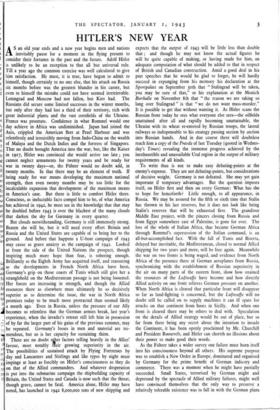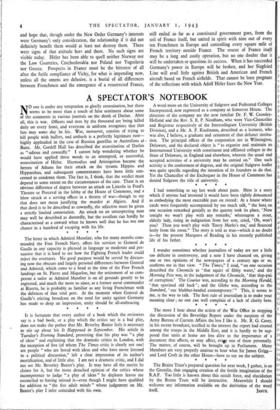HITLER'S NEW YEAR
AS an old year ends and a new year begins men and nations inevitably pause for a moment in the flying present to consider their fortunes in the past and the future. Adolf Hitler is unlikely to be an exception to that all but universal rule. Till a year ago the common exercise was well calculated to give him satisfaction. He must, it is true, have begun to admit to himself, though certainly to no one else, that his attack on Russia six months before was the greatest blunder in his career, but even to himself the mistake could not have seemed irretrievable. Leningrad and Moscow had not fallen, but Kiev had. The Russians did secure some limited successes in the winter months, but only after they had lost a third of their territory, rich with great industrial plants and the vast cornfields of the Ukraine. France was prostrate. Confidence in what Rommel would one day achieve in-Africa was undiminished. Japan had joined the Axis, crippled the American fleet at Pearl Harbour and was relentlessly and irresistibly moving from Indo-China on the wealth of Malaya and the Dutch Indies and the fortress of Singapore. That no doubt brought America into the war, but, like the Kaiser in 1917, Hitler was convinced she would arrive too late ; you cannot neglect armaments for twenty years and be ready for war in twenty days—or, the Fiihrer would no doubt add, in twenty months. In that there may be an element of truth. If being ready for war means developing the maximum national strength, then even twenty months may be too little for the incalculable expansion that development of the maximum means in America's case. But there is little to comfort Hitler there. Conscious, as ineluctable facts compel him to be, of what America has achieved in 1942, he must see in the knowledge that that may be doubled before 1943 is over the blackest of the many clouds that darken the sky for Germany in every quarter.
But clouds notwithstanding, Germany is still immensely strong. Beaten she will be, but it will need every effort Britain and Russia and the United States are capable of to bring her to the ground. And before that happens a U-boat campaign of 1943 may cause as grave anxiety as the campaign of 1942. Looked at from the side of the United Nations the prospect, though inspiring much more hope than fear, is sobering enough. Brilliantly as the Eighth Army has acquitted itself, and reassuring as the developments in French North Africa have been, Germany's grip on those coasts of Tunis which still give her a stranglehold on the Mediterranean passage is not being loosened. Her forces are increasing in strength, and though the Allied resources there as elsewhere must ultimately be so decisively superior as to determine the issue, the war in North Africa promises today to be much more protracted than seemed likely a month ago. Even in Russia, unless the pressure of our Ally becomes so relentless that the German armies break, last year's experience, when the invader's retreat still left him in possession of by far the larger part of his gains of the previous summer, may be repeated. Oertnany's losses in men and material are tremendous, but so is her capacity for sustaining them.
There are no doubt ogler factors telling heavily in the Allies' favour, most notably EISeir growing superiority in the air. The possibilities of sustained attack by Flying Fortresses by day and Lancasters and Stirlings and like types by night must impinge at least as forcibly on Hitler's consciousness as they do on that of the Allied commanders. And whatever desperation is put into the submarine campaign the shipbuilding capacity of Britain, the United States and Canada is now such that the threat, though grave, cannot be fatal. America alone, Hitler may have noted, has launched in 1942 8,000,000 tons of new shipping and expects that the output of 1943 will be little less than double that ; and though he may not know the actual figures he will be quite capable of making, or having made for him, an adequate computation of what should be added to that in respect of British and Canadian construction. Amid a good deal in his past speeches that he would be glad to forget, he will hardly succeed in expunging from his memory his declaration at the Sportpalast on September 3oth that "Stalingrad will be taken, you may be sure of that," or his explanation at the Munich Bierhalle on November 8th that "the reason we are taking so long over Stalingrad" is that "we do not want mass-murder." It is possible to get that without wanting it. As Hitler scans the Russian front today he sees what everyone else sees—the oilfields unattained after all and rapidly becoming unattainable, the Ukraine with its wheat re-entered by Russian troops, the lateral railways so indispensable to his strategy passing section by section into Russian hands. And in due course there will doubtless reach him a copy of the Pravda of last Tuesday (quoted in Wednesday's Times) revealing the immense progress achieved by the inexhaustible and unassailable Ural region in the output of military requirements of all kinds.
To write thus is not to make easy debating-points at the enemy's expense. They are not debating-points, but considerations of decisive weight. Germany is not defeated. She may yet gain important if temporary advantages. But the question imposes itself, on Hitler first and then on every German: What has she to hope for henceforth? Little enough, to all appearance, in Russia. We may be assured for the fifth or sixth time that Stalin has thrown in his last reserves, but it does not look like being Stalin's reserves that will be exhausted first. The grandiose Middle East project, with the pincers closing from Russia and from Egypt somewhere east of Palestine, is gone for ever. The loss of the whole of Italian Africa, that became German Africa through Rommel's supersession of the Italian command, is an all-but-accomplished fact. With the fall of Tunis and Bizerte, delayed but inevitable, the Mediterranean, closed to normal Allied shipping for two years and more, will be free again. Meanwhile the war on two fronts is being waged, and evidence from North Africa of the presence there of German aeroplanes from Russia, synchronising with the establishment of Russian superiority in the air on many parts of the eastern front, show how strained the resources of the Luftwaffe have become and how directly Allied activity on one front relieves German pressure on another. When North Africa is cleared that particular front will disappear so far as land-fighting is concerned, but the Luftwaffe will no doubt still be called on to supply machines it can ill spare for attacks on that continent from bases in Sicilly. And when one front is cleared there may be others to deal with. Speculation on the details of Allied strategy would be out of place, but so far from there being any secret about the intention to invade the Continent, it has been openly proclaimed by Mr. Churchill and President Roosevelt, and Hitler can cherish no illusions about their power to make good their words.
As the Fiihrer takes a wider survey one failure must burn itself into his consciousness beyond all others. His supreme purpose was to establish a New Order in Europe, dominated and organised by Germany for the prime benefit of German industry and commerce. There was a moment when he might have partially succeeded. Small States, terrorised by German might and depressed by the spectacle of Allied military failures, might well have convinced themselves that the only way to preserve a relatively tolerable existence was to fall in with the German plans and hope that, though under the New Order Germany's interests were Germany's only consideration, the relationship if it did not definitely benefit them would at least not destroy them. There were signs of that attitude here and there. No such signs are visible today. Hitler has been able to quell neither Norway nor the Low Countries, Czechoslovakia nor Poland nor Yugoslavia nor Greece. Prospects in France must be the bitterest of all after the futile compliance of Vichy, for what is impending now, unless all the omens are delusive, is a burial of all differences between Frenchmen and the emergence of a resurrected France, still exiled so far as a constituted government goes, from the soil of France itself, but united in spirit with nine out of every ten Frenchmen in Europe and controlling every square mile of French territory. outside France. The rescue of France itself may be a long and costly operation, but no one doubts that it will be undertaken or questions its success. When it has succeeded Germany's power in Europe will be broken, and her Siegfried Line will avail little against British and American and French aircraft, based on French airfields. That cannot be least pregnant of the reflections with which Adolf Hitler faces the New Year.























 Previous page
Previous page